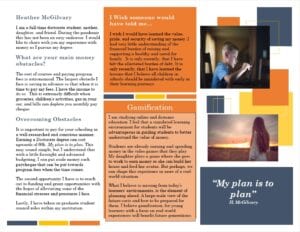When I first began high school, I constantly asked myself, “who am I?” I knew that at the end of my journey, I would be choosing universities, possibly moving cities, and paving the road that will lead me to the rest of my life. Now having completed high school, I still find myself asking this question. Unlike my peers, I do not see myself as a writer, economist, scientist, or artist. I see myself exclusively as a learner; nothing more, nothing less. Despite my uncertain career goals and the excessive costs, it is enough that I see myself as a learner to want to go to university.
However, this uncertainty comes at a cost, and I accept that I may face many years of university in order to find out who I am. While the extraordinary costs associated with the university can be frightening, by employing ordinary measures consistently, the costs can be impactfully reduced.

The first excessive cost I encountered when making my university plans was tuition and residence. While I had previously fantasized about moving to exciting new cities, I realized that would cost me upwards of $40,000 throughout my degree. After coming to this conclusion, I decided to go to university in my own city.
Thankfully, my local university is still very well ranked, and I couldn’t rationalize spending an additional $40,000 for my bachelor’s when it was not necessary. By addressing this, I have saved myself at least twice what I will pay to earn my degree locally. Another excessive, but mandatory cost of university is the cost of a laptop.
This is especially needed after much of the world has spent over a year educating and teaching online. To encapsulate the importance of technology in the 21st century, it is now the main means of communication and access to resources. It is essentially an extension of a student. This proves to be a financial obstacle because, for the sake of the quality of your education, you should seek a high-quality computer with appropriate features. As an engineering student, this means a device that can design and has large enough hardware to run these consuming designing software. Consequently, this means purchasing a more expensive device, not including any warranties in order to preserve such a high-quality device for one’s entire university career. This provides a financial dilemma; frugality may end up costing more over the long run.

To address this, I’ve decided it is more financially responsible to purchase a good quality device and warranty at a higher price. However, this still doesn’t assist the extraordinary cost of a quality computer, so in order to respond to this, I’ve researched the qualities I need and don’t need in a computer. This is an important step, because if you’re anything like me and don’t understand much about computers, you can be easily fooled into paying premium prices for qualities you don’t need. The next step is creating a reasonable budget and allocating funds to purchase within that budget.
As with many expensive purchases, often consumers can pay more for a lower quality item because of payment plans and the interest involved with these plans. While with many purchases (such as homes) it is not possible to avoid paying more in interest, you can often avoid it with technology if you budget properly. Additionally, by researching promotional sales dates and searching for product in several different stores, I will be able to purchase the same high-quality device for a lower price. Lastly, my final effort to assist my purchase of a computer is applying to scholarships. While it is not financially responsible to rely on winning scholarships, it would only take one scholarship to pay for a computer and put my saved up money to better use. In such a case, I plan on using any funds originally allocated for my computer to build up my savings. It is decisions like these that will help me get through the next four years of my life with the fewest losses, because in this world money truly is power.
The extortionate costs associated with university, and the struggle to come out alive, often make me wonder where the system fails us. Undoubtedly, the cost of tuition is unreasonable. However, universities are far from the only offenders in the world of financial illiteracy. The fact that those who don’t go to university also struggle with money management is a testament that there is something deeper rooted in our society that fails our personal finances. I have always pursued the best education offered in my vicinity. It upsets me that I have now graduated high school with a bilingual International Baccalaureate diploma, and vast knowledge about the USSR’s spheres of influence, yet no knowledge about navigating personal finance. As such, the first step to improving financial literacy to children under 18, is simple and straightforward; introduce it. In other words, with such desolate resources for children to learn about money management, anything would be a drastic improvement.
However, in correspondence with my convictions, we must strive for the best, and it is not enough to merely introduce the knowledge that can change the course of a person’s life.
I believe topics pertaining to student loans and savings should be studied by children at an age where they have yet to begin working part-time or summer jobs. As a high schooler, I have seen many of my friends work every shift they can, only to spend it on frivolous items. Those same friends now face a mountain of loans and debt as they plan their university careers. To combat this, one must understand the cost of university the importance of savings before making decisions related to these items. Another topic is sustainable financial plans. Just as I have seen my friends blow through their hard-earned money, I have seen others impose overly frugal budgets on themselves, only to grow tired of them, and end up spending their money just as quickly. For these individuals, it would be better for them to only save a reasonable amount, instead of excessively indulging and ending up with no savings. This concept is also applicable to retirement savings, which require consistent contributions in order to amount to anything. I believe that by teaching the concepts of savings, and sustainable financial plans in-depth, the financial literacy of the coming generations will drastically change for the better.
Revisiting the question “who am I?” I still don’t know, and I accept that. But I realize what impact being a learner is. Because I am a learner, I am sensible in my finances and clever in the ways that I spend. Because I am a learner, I am a teacher, and I long to teach what I have learned to the next generation. Being a learner means being a little bit of everything. I am not ‘only ‘a learner, I am a little bit of a writer, economist, scientist, and artist. And most of all, I am proud to navigate personal finance, build up my savings, and even pay my tuition, because it’s all for the sake of being a learner.




